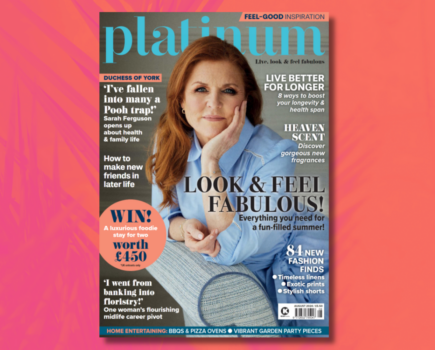With the spending season upon us, Aaliyah Mora-Khan, certified Trauma of Money practitioner, shows you how to boost your financial “emotional quotient” and resilience.
The holiday season is a magical time, but it can also trigger complex emotions, particularly around finances. We all want to experience the spirit of giving, yet the allure of indulgence can leave us with a spending hangover come January.
With the cost of living so high, this Christmas presents an excellent opportunity to evaluate your spending habits and boost your financial emotional intelligence and resilience, even if it stirs up deep-seated emotional triggers related to money.

Generational attitudes to finances:
The key to your relationship with money lies in the past. Generational context, cultural heritage and personal life stories combined determine your financial attitudes. Financial emotional resilience is the process of becoming aware of unconscious behaviours and taking action. But where do you start?
The most obvious influence on your financial decisions is often which generation you belong to:
Silent generation (born 1925-1945): Born around the Great Depression and living through WWII, this generation grew up with rationing and austerity, resulting in a waste-not, want-not approach to life. As adults, most have a strong sense of financial security as there was full employment and free NHS care after WWII.
Baby boomers (born 1946-1964): Born after WWII, the early group of this generation also grew up with rationing and austerity, but the later group less so. As adults, this generation benefited from free student grants and low house prices, so have a greater sense of abundance.
Generation X (born 1965-1980): Born as the threat of nuclear annihilation loomed, this generation grew up with unions striking for better pay and the Winter of Discontent. Adults of this generation faced mass unemployment, the boom-and-bust cycles and massive social change from the end of the Cold War.
Many of us can relate to generational patterns, either in ourselves or within the generations that raised us. Understanding that these patterns were shaped by historical events beyond your control can make it easier to accept and address our financial behaviours.
How culture affects your financial attitudes
Cultural heritage is another layer that significantly influences financial attitudes and actions. Messages from your background, community, or religious beliefs often guide your financial choices. Whether it’s advocating for a modest lifestyle, promoting charitable giving, or valuing material possessions, recognising these cultural themes allows you to decide whether they align with your personal values.
And lastly, you can examine the layer of your personal story as it provides a unique perspective on your financial behaviour. Whether you’ve faced financial challenges, benefited from student grants, or navigated single parenthood, your personal story has shaped your financial journey.
These three factors are the main drivers of your emotions around money. And as emotions drive behaviours, it pays – often literally! – to become aware of your emotions and behaviours in relation to finances. Learning how to recognise what’s called your “financial emotional indicators” is key to finding the best response when it comes to making financial decisions and purchases.

Finances and the nervous system
As you navigate the holiday season, take some time to have a think about how your nervous system responds to financial triggers. Your nervous system responds to perceived threats in one of four ways: activation (hyperarousal), which is the well-known fight-or-flight response. It’s easily identified by feeling an increase in energy, often characterised by wanting to confront the situation or by feeling the need to leave quickly; there is also the response of inactivity (hypo-arousal), which results in the lesser-known freeze/fawn response, characterised by the inability to act or by trying to appease the situation.
Recognising these physical reactions, even during seemingly mundane activities such as shopping, helps you understand your emotional responses to money. For instance, a tightening in your stomach when you pay for something may indicate a fear of running out of money and losing financial security. The speed
at which your body recovers from these percieved threats measures your nervous system’s resilience.
EMOTIONAL BALANCE
Being able to consciously identify what emotions you’re feeling, and be in control of how/if you express them, is called emotional regulation. Emotions are layered on top of your bodily responses so you are more likely to say “I’m scared” than to name the feeling, like a contracted stomach.
When your nervous system and emotional regulation align effectively, you enter a state of emotional balance, known as the “window of regulation”. This state is ideal for making financial decisions and restoring equilibrium.
So, how can you build financial emotional resilience during the holiday season? The first step is to stay within the window of regulation. This means recognising when you’re caught in a money behaviour pattern, disrupting it, and responding from a more conscious, balanced state.
RECONNECT
Notice what is happening to your emotions during an emotional spike. Are you feeling tense because you don’t know how you can afford it all? Are you feeling giddy about a splurge? Take a moment to breathe and get more oxygen into your body. Try the 4-7-8 technique: inhale for four counts, hold for seven, exhale for eight. Repeat for five breaths. This should help regulate your nervous system.
Notice what is happening in your body by doing a body scan, focusing your attention from the top of your head down to your feet. Notice where you are holding tension, what temperature different body parts are, or if your skin is being touched by clothing. Label what you’re feeling, even if it starts with basic descriptors like hot/cold.
REGULATE
If you’re in an activated state, try to become present again with a technique called “orienting”. Slowly look around and notice what catches your attention; let your eyes lead which way you turn your head. Notice what is different within you as you look at your surroundings.
If you’re in an inactive state, get more deeply connected to your body by taking a walk or a cold shower. Once you’ve returned to the window of regulation, you can make wise decisions about your finances gain.
Navigating the holiday season can be a transformative journey of self-discovery and empowerment. By understanding the three layers of influence on our financial behaviours, embracing our financial emotional intelligence and staying within the window of regulation, we can make wiser financial decisions.

QUIZ: Are you a hoarder, hater, seeker or saver?
Answer the questions to determine your money EQ! Tally up your As, Bs, Cs, and Ds as you go, then check out your result at the end.
1. When it comes to holiday gifts, you are most likely to:
a. Splurge on extravagant gifts for everyone.
b. Feel guilty about spending money.
c. Showcase your wealth with thoughtful and lavish presents.
d. Stick to a budget and find practical yet meaningful gifts.
2. Your approach to holiday decorations is:
a. The more, the merrier! You spare no expense on festive decor.
b. You avoid spending money on decorations to maintain simplicity.
c. Your home is a winter wonderland, adorned with luxury decorations.
d. You reuse decorations from previous years to save money.
3. During holiday sales, you are most likely to:
a. Go on a shopping spree and buy things you don’t really need.
b. Feel uneasy about participating in consumerism and avoid sales.
c. Splurge on high-end items to showcase your affluence.
d. Strategically shop for discounted items to save for the future.
4. When faced with the option of hosting a holiday party:
a. You spare no expense to throw the most extravagant party.
b. You hesitate to spend money on hosting and might opt for a modest gathering.
c. Your party is a showcase of opulence and luxury.
d. You carefully budget and plan a gathering without overspending.
5. Your attitude towards holiday travel is:
a. Plan an elaborate holiday trip regardless of the cost.
b. Feel guilty about spending money on travel and avoid it.
c. Choose luxurious destinations to display your financial status.
d. Plan a budget-friendly trip and save money for future travels.
6. When the holiday credit card statement arrives, you:
a. Brush it off and continue spending.
b. Feel guilty and stressed about the expenses.
c. Nonchalantly pay the bill, enjoying the luxury you’ve acquired.
d. Review it carefully, ensuring expenses align with your budget.
7. Your gift-giving philosophy is:
a. The more expensive, the better; it’s about grand gestures.
b. Gifts should be thoughtful, not necessarily expensive.
c. Expensive gifts are a way to showcase your generosity.
d. Practical gifts that align with the recipient’s needs and your budget.
8. Your reaction to an unexpected holiday expense is:
a. Charge it to the credit card; worry about it later.
b. Feel stressed and anxious about the additional cost.
c. Handle it without flinching, your wealth can cover it.
d. Adjust your budget to accommodate it.
9. In the days leading up to the holidays, you are most likely to:
a. Continue shopping for those last-minute splurges.
b. Feel a sense of guilt and anxiety about holiday spending.
c. Flaunt your wealth through holiday-related purchases.
d. Stick to your budget and enjoy the festivities without financial worries.
10. Your New Year’s resolution regarding finances would be:
a. Make more money and spend even more.
b. Overcome guilt and develop healthier financial habits.
c. Continue to display wealth while managing it more discreetly.
d. Maintain or improve financial stability through disciplined saving.
Results…
Mostly A: You’re “The Hoarder”. You enjoy spending and believe that more money will bring happiness.
Mostly B: You’re “The Hater”. You have complex feelings about money – guilt often influences your financial decisions.
Mostly C: You’re “The Seeker”. You believe in displaying your status, wealth and living luxuriously.
Mostly D: You’re “The Saver”. You prioritise frugality and savings.
Remember, this quiz is all in good fun! Understanding your relationship with money can help you make better choices. Enjoy the festive season and shop wisely.
WORDS: Aaliyah Mora-Khan. IMAGE OF AALIYAH: Julia Mora-Khan.








